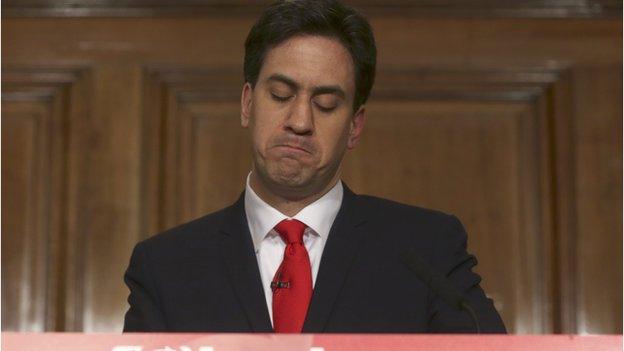David Lammy considers Labour leadership bid
- Published
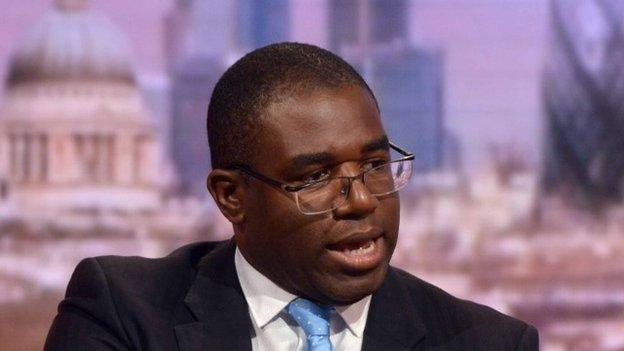
Mr Lammy was re-elected as Labour MP for Tottenham on Friday with an increased majority
David Lammy has said he will consider standing for Labour leader if colleagues want him to do it.
The MP for Tottenham said it was "absolutely time" for a new generation to "step up to a leadership role".
Mr Lammy is putting together a bid to be Labour's candidate for Mayor of London in 2016 but said he has not discounted a tilt at the top job.
But Alan Johnson has ruled himself out, saying the new leader faces a "10-year task" to rebuild Labour.
No contenders have yet come forward in the race to succeed Ed Miliband, who stepped down after Labour's defeat.
Yvette Cooper, Andy Burnham and Chuka Umunna are seen as the frontrunners.
Former soldier and shadow justice minister Dan Jarvis is also being tipped as a possible contender. He has declined to comment on leadership speculation.
'Stepping up'
Harriet Harman is to serve as acting leader until a leadership contest takes place later this summer. She has said she will stand down as deputy leader later this year.
Mr Lammy told the BBC that "there were lots of names in the fray" and he would take soundings in the coming days as to whether to enter the contest.
"I've been in the Parliamentary Labour Party for fifteen years and certainly for people like me it's absolutely time to step up into a leadership role," he said.

Labour's election rules

MPs wishing to stand as leader and deputy leader have to be nominated by 15% of their colleagues in the Parliamentary Labour Party to be eligible to stand.
As Labour now has 232 MPs, this means prospective candidates must get at least 34 signatures. That means the maximum size of any field is six contenders.
Under rules agreed last year, all Labour Party members, registered supporters and affiliated supporters - including union members - will be allowed a maximum of one vote each on a one member, one vote system.
When the election is held, they will be asked to rank candidates in order of preference.
If no candidate gets 50% of all votes cast, the votes will be added up and the candidate with the fewest votes eliminated. Their 2nd preference votes will then be redistributed until one candidate has 50% of all votes cast.

"Now, I have been thinking very, very carefully and indicating that I want to seek the Labour nomination for London mayor.
"But actually, putting together that team, now that we have a proper race to lead the party, of course, me and others are looking very carefully at who is the best leader and if colleagues come to me over the coming days and say "look, David, why don't you put your [hat in] I will look at it."
Mr Lammy, who is regarded as being on the right of the party, was a minister under Tony Blair and Gordon Brown having first entered Parliament in 2000.
He gained a national profile for his response to the shooting of Mark Duggan in his constituency in August 2011, which sparked riots across London and other cities.
'10-year job'
Asked whether he had been approached by colleagues to run, he said: "They want me to step up for something.
"I think the question is whether that is here in London or the country at large. My passion instinctively is for London".
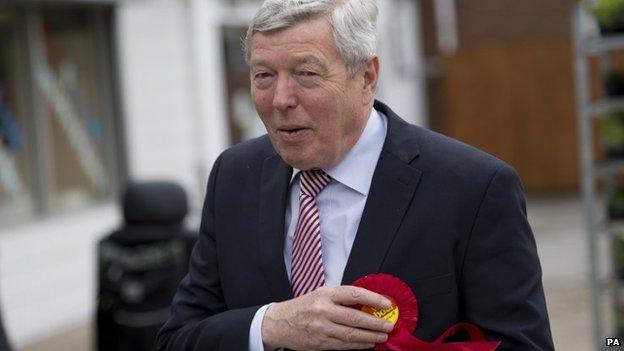
Mr Johnson said he did "not have the qualities" to be leader
A former Labour home secretary has suggested it could take a decade for Labour to recovery from its defeat.
Alan Johnson, who has ruled himself out of the contest, said the party needed a "proper rethink" about its direction and the new leader would have a big job on their hands.
"This is a ten-year task," he told Radio 4's Today programme "This is a job for the future...It is much more fundamental than just changing the leadership."
Mr Johnson said Mr Miliband had run a "decent campaign" but he was alarmed that the party had been unable to recapture seats in the south of England it held between 1997 and 2010, such as Hastings and South Thanet.
Labour, he suggested, had lost contact with Middle England, which had propelled it to three successive election victories under Tony Blair, and the party needed to consider its sense of purpose if it was to get back into power at the next attempt.
"Why have we lost this crucial issue that was important from 1945 onwards for Labour - that is aspiration. Aspiration for our children and our future....We can not longer relate to them as a party of aspiration."
He added: "You would have thought Tony Blair lost three elections rather than won three elections. It is almost de rigueur not to mention his name. It is a fundamental flaw."
Labour's National Executive Committee, the party's ruling body, is expected to set out a timetable for the contest next week.
In 2014, the party changed the rules for future contests to move to a "one member, one vote" system of party members, affiliated trade union supporters and registered supporters.
- Published8 May 2015
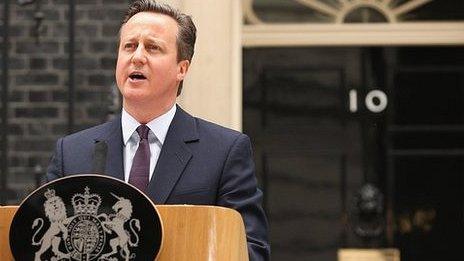
- Published12 September 2015
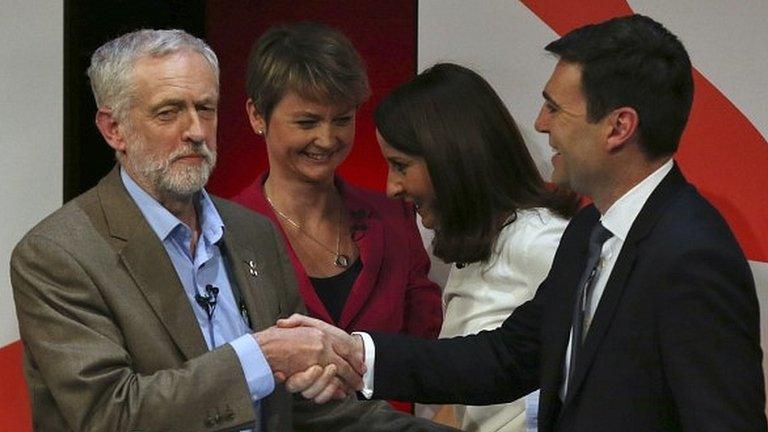
- Published8 May 2015
